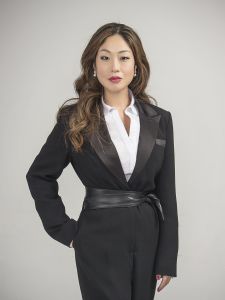Since this spring, the mdw has been cooperating actively with the newly founded Korean Cultural Center in Vienna’s 1st district. Sun Ok Lee—the Center’s artistic director and herself an mdw alumna—speaks in the following about cultural similarities, the importance of self-management, and supporting young musicians.

At the festive grand opening of the Korean Cultural Center on Vienna’s Kärntnerstraße in May of this year, music was already front and centre: a multifaceted concert programme ranging from traditional Korean to Western classical music and on to crossover was performed with Korean Prime Minister Han-Duck-soo in attendance. Violinist Sun Ok Lee was among those who took the stage, presenting a sonic fusion of classical and Korean elements together with Gerald Schuller and Johannes Kretz.
In her capacity as the Korean Cultural Centre’s artistic director, Sun Ok Lee is curating a concert series in cooperation with the mdw whose 2023/24 iteration will feature either music students of Korean origin or musical programmes that include works by Korean composers. The planned events encompass standard concerts as well as after-work and children’s formats in which numerous mdw departments will be involved. “As Korean Cultural Center Director Jin Hong Rim stated when we announced this cooperation with the mdw, the Korean Cultural Center is first and foremost an ambassador of Korean culture in Austria,” says Sun Ok Lee. “At the same time, however, we’d also like to become a hotspot of high-quality music in Vienna that attracts a broad audience. Moreover, it’s a great desire of ours to become an interesting performance venue for outstanding musicians.” With all this in mind, Jin Hong Rim and Sun Ok Lee are pursuing concrete objectives in terms of providing support to young talents as they transition from life as students to their professional concert careers. The idea is to offer them attractive performing opportunities at the Korean Cultural Center that bring them together with an interested audience as well as with potential future patrons. “The musicians who perform at the Korean Cultural Center should, first of all, have the opportunity to build out their networks, and the second thing is that they should be paid fairly and well for their work—which is something that unfortunately doesn’t go without saying for young musicians. And in general, we’re looking to give Korean students an opportunity to present themselves as well as to bring Austrian students into contact with Korean music.”
You have to start thinking about how the music market looks and how you’d like to position yourself within it even during your studies.
Sun Ok Lee’s prioritisation of support for music students is owed to the path that she herself travelled as an artist: it was at the early age of 14 that she began her performance-oriented violin studies at the mdw, where she returned later on to pursue her doctorate—as part of which she analysed musicians’ career paths. “Back when I first began studying, I was naturally aiming for a solo career,” Sun Ok Lee recalls. “For a long time, the classical route was all I knew—and with support from Riccardo Muti and Vladimir Spivakov, I actually did make it onto major stages. It was only later that I got to know crossover concepts. The musical profile of Nigel Kennedy, for instance, fascinated me enormously—as did the disparities in fees, which are many times wider in this area than in the classical realm.” Over the course of her doctoral studies, she closely scrutinized aspects of self-management and developing one’s own artistic profile. “You have to start thinking about how the music market looks and how you’d like to position yourself within it even during your studies. Artists are among those for whom it’s important to develop something like a brand. Especially at a world-class university like the mdw, you see how intense the competition and the attendant pressure are at the very top, where everyone’s playing at the highest level. In order to stand out here, you need to reflect thoroughly upon your strengths and weaknesses so you can recognise and take the appropriate steps toward possible career paths.”
It’s for this reason that Sun Ok Lee regards the phase between one’s studies and one’s career as a central, key moment. Alongside her classical career, she also successfully built up a profile in the crossover field under the stage name of “Korea Lee” and developed a target audience-specific programme for the purpose. “In that context, what I do includes things like appearing at big events put on by luxury goods producers.”
Korean culture, above all its pop culture, is enjoying growing popularity worldwide, while Austria is the quintessential classical music country.
With the concert programmes at the Korean Cultural Center, as well, Sun Ok Lee is seeking to address a broad audience including classical music lovers and established representatives of the arts and business worlds as well as a new—and, importantly, young—musical audience. “Korean culture, above all its pop culture, is enjoying growing popularity worldwide, while Austria is the quintessential classical music country. And even if these two countries are quite far apart culturally, I do also see a lot of similarities—like in terms of mentality and economic developments. Here at the Korean Cultural Center, we’d like to reflect that in music. We’re therefore looking to put highly talented students from Austria and Korea onstage together, and we’d of course also be happy if we could make Korean musical repertoire better known in Vienna. There are lots of K-pop fans in Vienna—but back in the era of Viennese Classicism, Korea was witnessing the composition of its own classical works…”
Further informationen as well as all events are available on the Website of the Korean Cultural Center.

